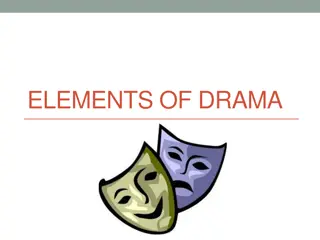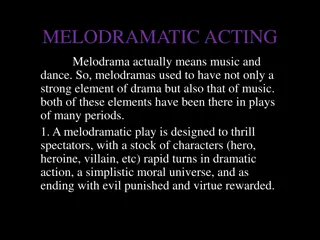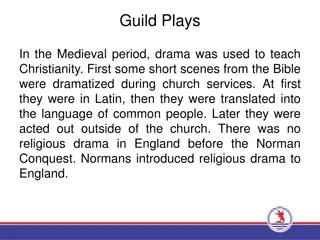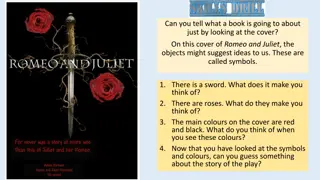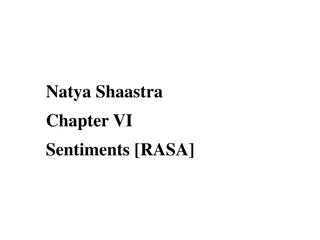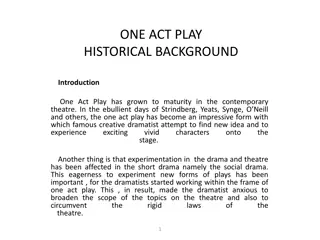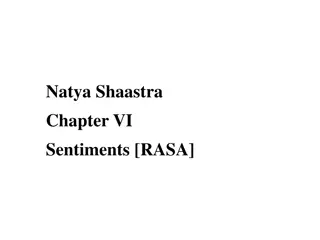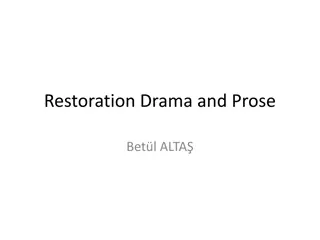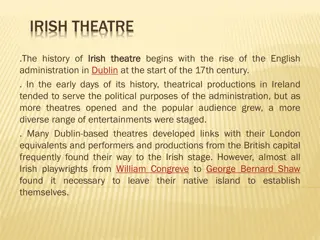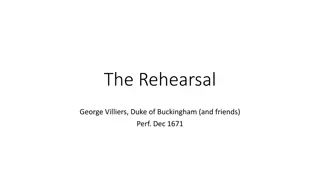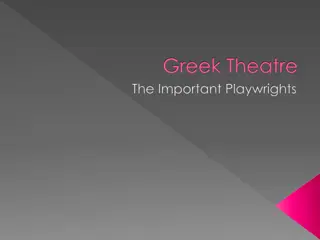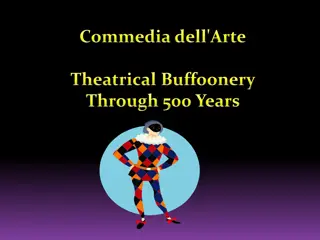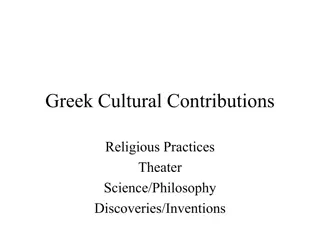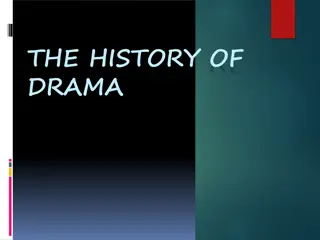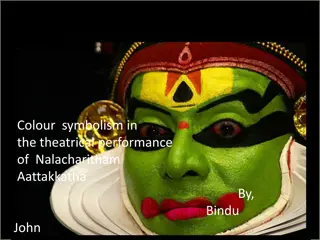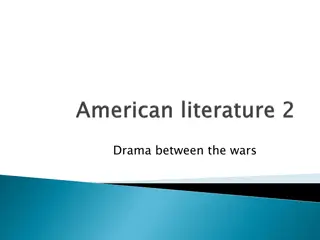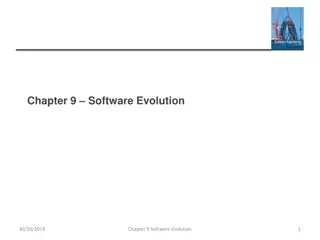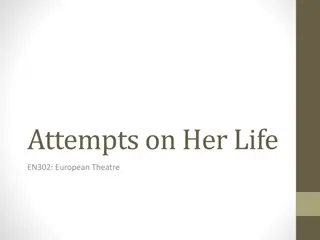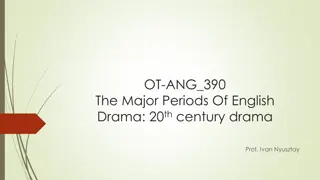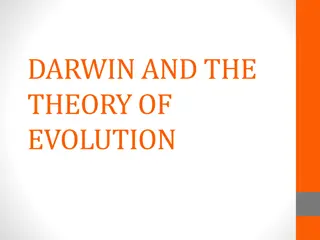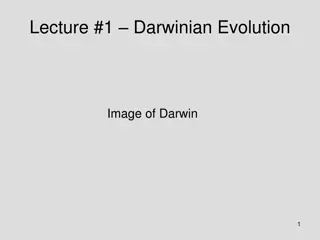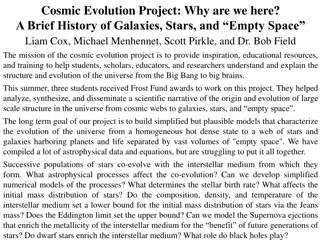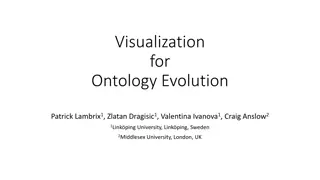Understanding the Elements of Drama and Theater History
Drama, originating from the Greek verb "dran," involves acting and storytelling in front of an audience. Explore the key aspects, from the Globe Theater in London to dramatic structure, actors, and speech forms like dialogue and monologue. Learn about the crucial components such as playwrights, acto
4 views • 22 slides
Exploring Performance and Storytelling in 'Hag-Seed' Prologue
In the prologue of "Hag-Seed" by Margaret Atwood, the performative nature of storytelling is vividly portrayed through the setting of a theatrical performance within the novel. Atwood intertwines themes of reimagining existing stories, life as a performance, and the connection to Shakespeare's works
1 views • 6 slides
If you are looking for Venue Selection in The Lakes
If you are looking for Venue Selection in The Lakes, Dusk Till Dawn Entertainment is leading turnkey event solutions provider in Las Vegas. With almost two decades of experience in the industry, we have taken care of all the groundwork, so you don't have to. From corporate gatherings to private affa
0 views • 6 slides
Understanding Melodramatic Acting in Theatre
Melodramatic acting in theatre combines elements of drama, music, and spectacle to create thrilling performances for audiences. These plays feature stock characters, rapid dramatic action, and a simplistic moral universe where good triumphs over evil. Actors in melodramas must master melodramatic sp
0 views • 7 slides
Medieval Drama: Guild Plays and Moral Lessons
Learn about the evolution of medieval drama in England, from religious guild plays to morality plays and interludes. Guild plays, including mystery and miracle plays, were performed by craft guilds to teach Christianity through biblical stories. Morality plays like "Everyman" aimed to impart moral l
3 views • 9 slides
Symbols and Facts: Uncovering Shakespeare and Elizabethan Theatre
The analysis begins by exploring the symbols present on the cover of "Romeo and Juliet" such as the sword and roses. It then delves into distinguishing facts from opinions regarding Shakespeare's life, touching on key events like his baptism, marriage, and career. Additionally, it provides insights
0 views • 26 slides
Ancient Indian Theatrical Art Forms and the Theory of Rasa in Natya Shastra
The Natya Shastra, attributed to Bharata Muni, is an ancient treatise influencing Indian dance, music, and literary traditions. This comprehensive work covers various aspects of theatre, including acting, dance, music, and more. The concept of Rasa, denoting the aesthetic essence that evokes emotion
0 views • 18 slides
Evolution of One-Act Plays in Contemporary Theatre
One-Act Plays have evolved significantly in contemporary theatre, with famous dramatists like Strindberg, Yeats, and Synge experimenting with this concise form. Initially farcical, one-act plays became more focused, dealing with single dominant situations and themes like human life's complexities. T
0 views • 5 slides
Devising Drama - GCSE Knowledge Organiser
This GCSE Drama Knowledge Organiser provides guidance on devising and performing an original piece of theatre based on a stimulus. It covers how to respond to stimuli, develop ideas for theatrical performances, apply theatrical skills, analyze and evaluate work, and rehearse and refine the devised p
0 views • 10 slides
Exploring the Rasa Theory in Natya Shastra: An Ancient Guide to Indian Theatrical Arts
The Natya Shastra, attributed to Bharata Muni, is a comprehensive treatise on the arts that has shaped Indian dance, music, and literary traditions. This ancient text delves into various aspects of theatre, such as acting, dance, music, and construction, providing a foundation for Indian theatrical
3 views • 18 slides
Exploring Restoration Drama and Prose in the Era of Charles II
In 1660, with Charles II's ascent to the throne, Restoration literature saw a revival alongside the political landscape. Playwrights like John Dryden and Thomas Otway contributed significant works, with genres ranging from heroic plays to satirical comedies. The era also witnessed the emergence of t
1 views • 12 slides
History and Evolution of Irish Theatre
Irish theatre has a rich history intertwined with politics and cultural developments. From serving political purposes in the 17th century to nurturing indigenous writers and performers in the 20th century, Irish theatre has seen significant evolution. Dublin has been a key hub for theatrical product
0 views • 24 slides
The Rehearsal and The Antagonists: Satire in Restoration Drama
The Duke of Buckingham's satirical play "The Rehearsal" marked a significant shift in Restoration drama by mocking contemporary heroic plays and literary figures like John Dryden. The play, first performed in 1671, achieved popularity and influenced a tradition of dramatic burlesque on the English s
1 views • 8 slides
Evaluating the Production Elements: Set Design, Props, Costume, Lighting, Sound, Special Effects, Acting & Directing
Use the guide slides to assess various production elements including set design, props, costume, lighting, sound, special effects, acting, and directing. Explore examples from scenes like Peter Pan teaching children to fly, impactful moments, successful elements, and set design descriptions. Gain in
1 views • 7 slides
Understanding Drama Form and Genre
Exploring the nuances of drama, this content delves into the intricate relationship between form and genre. Offering insights into the varied types of forms in drama such as scripted plays, physical theatre, mime, monologues, movement/dance dramas, musicals, and pantomimes, it emphasizes the flexibi
0 views • 17 slides
Insights into Greek Theatre's Renowned Playwrights and Dramatic Elements
Greek theatre history and key figures, including important playwrights like Aeschylus, Sophocles, and Euripides. Aristotle's theories on drama elements, Thespis' innovations, and Aristotle's Unities of Drama are explored. The impact of these elements and playwrights on ancient Greek theatre is highl
7 views • 9 slides
Insights into Italian Commedia dell'arte Traditions
A discussion on the unique characteristics of Italian commedia dell'arte, encompassing the challenges of dialects, minimalist staging with creative prop use, the art of improvisation, stock characters, and the iconic figure of Arlecchino. The performers' ability to improvise, employ comedic elements
4 views • 21 slides
Greek Cultural Contributions: From Olympics to Theater
Ancient Greek civilization made significant cultural contributions in various aspects such as religious practices, theater, and scientific discoveries. The Greeks had a rich tradition of honoring their gods through events like the Olympics and theatrical performances that continue to fascinate audie
4 views • 26 slides
Exploring Plastic Theatre in Tennessee Williams' "A Streetcar Named Desire
Tennessee Williams introduced the concept of plastic theatre in the 1940s to create a new type of theatrical experience that combined non-literary elements with the literary text. This approach aimed to enhance the themes, characters, and language of the play by integrating elements such as setting,
0 views • 9 slides
The Evolution of Drama: A Historical Journey
Drama, originating from ancient Greece, has evolved through the centuries from being a genre of poetry to a distinct theatrical form encompassing tragedy, comedy, and more. The masks of Thalia and Melpomene symbolize the essence of comedy and tragedy, while the Great Dionysia festival in Athens hono
0 views • 41 slides
Designing a Key Scene for Stage Types: In the Round and Proscenium Arch
Exploring the design considerations for key scenes on two different stage types, In the Round and Proscenium Arch. The strengths and weaknesses for performers and audience members are analyzed, offering insights into creating engaging and effective theatrical experiences.
0 views • 27 slides
Exploring Colour Symbolism in the Theatrical Performance of Nalacharitham Aattakkatha John Bindu
Delve into the captivating world of colour symbolism in the theatrical performance of Nalacharitham Aattakkatha John Bindu, where hues convey deeper meanings and emotions. Discover how colours like Pacha, Minukku, Karuthathadi, and more play a vital role in portraying characters and themes, enhancin
0 views • 13 slides
Protecting Older Adults from Scams Through Educational Theatre
This initiative titled "Hello Granny I Need Money" aims to protect seniors from scams by false grandchildren and other fraudsters through educational theatre performances. Developed in Stuttgart, Germany, since 2011, this project has seen significant success with multiple performances and partnershi
0 views • 23 slides
Drama Between the Wars: Evolution of American Theater
Exploring the evolution of American drama between the wars, from the Puritan rejection of theater to the emergence of American playwrights and the influence of European masters. The rise of popular forms like vaudeville and the impact of theatrical companies post-WWI, with a focus on key figures lik
0 views • 10 slides
Evolution of Compact Star-Forming Galaxies and Quiescent Galaxies
The evolution of galaxies from compact star-forming to quiescent states involves processes such as secular evolution, gas inflows, and star formation quenching. By studying the structural relations and star formation in these galaxies, insights are gained into their transition towards quiescence. Th
0 views • 12 slides
The Scopes Monkey Trial: Clash of Cultures and Evolution Debate
Following World War I, the Scopes Monkey Trial in Tennessee marked a pivotal clash between urban and rural cultures over the teaching of evolution. The trial, prosecuted by William Jennings Bryan and defended by Clarence Darrow, resulted in teacher John Scopes being found guilty of violating the ant
0 views • 9 slides
Understanding Rasa Theory in Indian Theatrical Arts
Explore the significance of Rasa theory in Indian theatrical arts as outlined in the Natya Shastra, an ancient treatise on performing arts. Discover how bhavas create rasas, evoking emotions in the audience and transporting them to a parallel world of wonder and reflection. Learn about the historica
0 views • 18 slides
Rules and Practices for Software Evolution Support
This content focuses on the importance of rules and practices to support software evolution, addressing challenges, benefits, and impact on ecosystems. It emphasizes the need for system-specific rules, automatic extraction of conventions, and client support. The evolution of software is highlighted
0 views • 65 slides
Evolution of Gay Theatre in America
Gay theatre in America has overcome societal challenges, censorship, and stereotypes to emerge as a vibrant and essential part of the theatrical landscape. From the early struggles of gay playwrights like Oscar Wilde and Tennessee Williams to the groundbreaking works of the Caffe Cino and the impact
0 views • 6 slides
Software Evolution: Managing Change and Evolution in Organizational Systems
Software evolution is an essential process for organizations to maintain the value of their critical business assets. It involves adapting to new requirements, addressing errors, and enhancing performance. The majority of software budgets in large companies are dedicated to evolving existing systems
0 views • 61 slides
European Theatre: Exploring Dramatic Elements and Themes
European theatre has a rich history and tradition that distinguishes it from other global theatre practices. From Aristotle's dramatic elements to the conflicts faced by characters like Antigone and Creon, this form of theater delves into themes of recognition, imitation, and conflict. Hans-Thies Le
0 views • 35 slides
Exploring the Evolution of English Drama in the 20th Century
In the realm of English drama in the 20th century, significant periods such as Modern British Drama, Naturalism, and the works of George Bernard Shaw shaped the theatrical landscape. From the rejection of past ideals to the emergence of new social commentary, playwrights like Shaw and Ibsen challeng
0 views • 39 slides
Darwin and the Theory of Evolution: A Comprehensive Overview
Darwin's Theory of Evolution encompasses the concepts of organisms changing over time and life evolving through natural selection. Influenced by scientists such as James Hutton, Jean Baptiste Lamarck, and Alfred Russel Wallace, Darwin's theory culminates in the idea of evolution by natural selection
0 views • 9 slides
Understanding Evolution: Key Concepts and Perspectives
Explore the concepts of Darwinian evolution, evidence for evolution, Darwin's theory, and the Modern Synthesis. Delve into the spiritual versus intellectual perspectives, the diversity of religious affiliations globally, and the compatibility of faith and science in understanding the natural world a
0 views • 91 slides
Unveiling the Cosmic Evolution: A Journey Through Galaxies, Stars, and Empty Space
Delve into the intricate story of the universe's evolution from its hot dense origins to the vast cosmic web of stars and galaxies. Explore questions on stellar birth rates, interstellar medium influences, and the role of dark energy. Follow the journey of three students working on the Cosmic Evolut
0 views • 30 slides
Comedy Evolution in Restoration Drama
Explore the evolution of comedy in Restoration drama, from the types of comedy to the major playwrights and their contributions. Learn about the dramatic and theatrical themes, conventions, and trends of the period 1660-1709, including the shift towards humane intrigue comedy and the influence of Sp
0 views • 15 slides
Understanding Evolution: Key Concepts and Perspectives
Explore the key concepts of Darwinian evolution, including evidence for evolution, Darwin's theory, and the Modern Synthesis. Reflect on the relationship between spiritual and intellectual perspectives, emphasizing that different ways of thinking can complement each other. Discover the diversity in
0 views • 91 slides
Visualizing Ontology Evolution for Improved Knowledge Management
Ontologies are dynamic entities that evolve over time, impacting semantically-enabled applications and knowledge acquisition. This work focuses on identifying desired functionalities for ontology evolution systems, highlighting the steps involved in ontology evolution, and emphasizing the importance
0 views • 16 slides
Evolution of Indo-European Languages through Phylogeny Estimation
Explore the evolution of Indo-European languages through phylogeny estimation under a model of linguistic character evolution. Follow the Computational Historical Linguistics Project's collaboration that began in 1994, leading to the development of methods and studies on homoplasy-free evolution and
0 views • 61 slides
Uncovering Theatrical Depths in Hamlet's Characterization
Unveiling the theatrical intricacies within Hamlet's character, this piece delves into the subtext of his actions and the underlying motives behind his feigned madness and calculated interactions, as depicted in A. Kernan's work "The Playwright as Magician". Through a close analysis of pivotal scene
0 views • 31 slides
